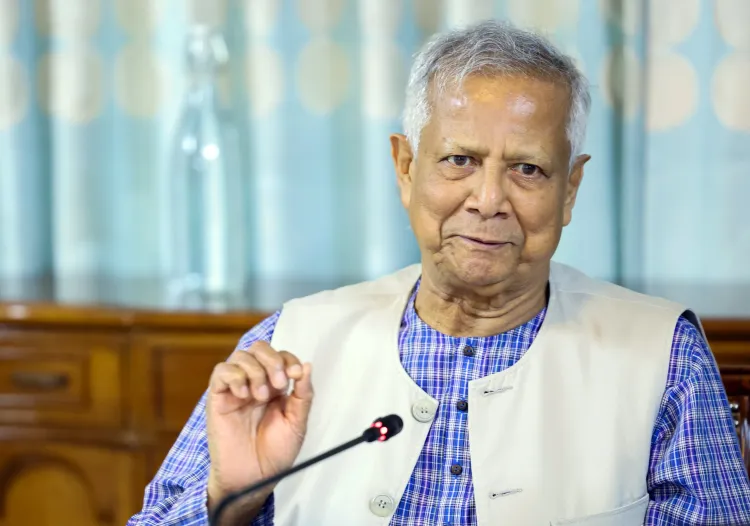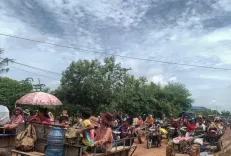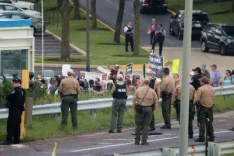Why Are Hundreds Protesting Against the Yunus-Led Interim Government's 'Black' Public Service Ordinance Law?

Synopsis
Key Takeaways
- Protests are escalating in Bangladesh against the Yunus-led interim government.
- Workers are demanding the repeal of the controversial Public Service Ordinance.
- Security agencies are on high alert amid ongoing demonstrations.
- The political landscape is increasingly uncertain as pressure mounts on the government.
- Calls for reform and accountability resonate throughout the nation.
Dhaka, May 27 (NationPress) As the interim government helmed by Muhammad Yunus nears the conclusion of its tenth month in power, various protests have emerged across Bangladesh, encompassing student rallies, labor strikes, and campaigns from women's rights groups and radical Islamist factions.
The nation has been ensnared in protests, political instability, and a rise in crime and violence since the Yunus-led administration took office in August, promising reforms.
On Tuesday, a protest that has now persisted for four days saw hundreds of workers from different government ministries and divisions assemble at the Secretariat in Dhaka, advocating for the retraction of the 'Public Service (Amendment) Ordinance, 2025', passed by the interim government.
Despite stringent security measures enforced by law enforcement, the demonstration and subsequent work stoppage at the Secretariat continued, as reported by local media.
The demonstrators, organized under the Bangladesh Secretariat Officers and Employees United Council, pledged to maintain their protests until the ordinance, deemed 'oppressive and a black law', is annulled.
Protesters marched, chanting slogans against the ordinance and calling for simultaneous demonstrations from government employees nationwide.
In response to the ongoing protests, security personnel are on heightened alert at the Secretariat, with elite forces including Special Weapons And Tactics (SWAT), Border Guard Bangladesh (BGB), and Rapid Action Battalion (RAB) deployed, according to the leading Bangladeshi daily Prothom Alo.
In compliance with a directive from the home ministry, entry for visitors and media personnel into the Secretariat has been restricted.
After the Council of Advisors approved the draft law on May 22 during an advisory meeting, government employees began protesting at the Secretariat, labeling the law as unjust and unconstitutional.
Reports indicate that the amended ordinance stipulates severe penalties for government officials who are disobedient, absent without leave, or hinder others from fulfilling their duties, which could lead to demotion, removal, or dismissal.
Separately, on Monday, supporters of BNP leader Ishraque Hossain and some employees of the Dhaka South City Corporation (DSCC) resumed their protests outside Nagar Bhaban, demanding Ishraque's immediate appointment as Mayor, issuing a 24-hour ultimatum to the government.
Meanwhile, three associated factions of the Bangladesh Nationalist Party -- Jatiyatabadi Chhatra Dal, Jubo Dal, and Swechchhasebak Dal -- declared plans to hold a significant rally titled 'Establishing the Political Rights of the Youth' outside the party's central office in Naya Paltan on May 28.
As pressure mounts on Yunus, he has expressed frustration over the current situation, indicating a desire to resign.
He lamented that the ongoing unrest is detracting from the government's focus on implementing reforms, delivering justice for the July killings, and preparing for a transparent electoral process.
A statement released on Saturday reiterated these concerns, indicating that such disruptions are not only obstructing routine governance but also causing confusion among the populace.









